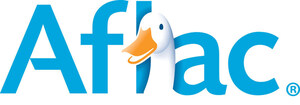COLUMBUS, Ga., Oct. 4, 2016 /PRNewswire/ -- Millennials now represent the largest segment of the U.S. labor force (53.3 million), and they have strong feelings about the compensation and other benefits they expect their employers to offer. Nearly two-thirds (65 percent) of millennials expect an annual raise, followed by 60 percent who said they expect to be offered major medical insurance coverage, according to the 2016 Aflac Open Enrollment Survey released today by Aflac (NYSE: AFL), the leading provider of voluntary insurance sales at the worksite in the United States.
However, the survey found that while millennials are clear about the benefits they expect, many are clearly having difficulty managing details for their major medical insurance benefits. In fact, more than half of millennials admit that they agree* that they do not understand how a high-deductible health plan really works, although 60 percent of millennials are enrolled in these plans.
The 2016 Aflac Open Enrollment Survey was conducted among 1,900 U.S. adults employed either full or part time in June and July 2016 by Lightspeed GMI on behalf of Aflac.
It's all about the benefits
Benefits matter to all workforce segments, but they're especially important to keeping millennials satisfied. How much do they matter? More than any other age group, 72 percent of millennials are likely** to take a job with lower pay but better benefits at a time when 66 percent of millennials say they are likely** to look for a new job in the next 12 months. Additionally, millennials who are extremely or very satisfied with their benefits are also more likely to be satisfied with their jobs, compared to those who are not very or not at all satisfied with their benefits (89 percent v. 27 percent).1
Beyond an annual raise and major medical insurance, additional top benefits choices for millennials include:
- Flexible work schedule: 44 percent.
- Regular access to professional training: 36 percent.
- Ability to work from home: 27 percent.
- An annual promotion: 31 percent.
And although student debt is currently a hot topic, more millennials said they expect free food/snacks at work (23 percent) than student loan payment assistance from their employer (19 percent).
"We know employee turnover is costly to employers – particularly smaller to mid-sized businesses – in terms of recruiting and training new employees, loss of institutional knowledge and stress on the remaining employees who must pick up the slack," said Matthew Owenby, senior vice president, chief human resources officer at Aflac. "And while not every employer can afford to offer pay raises and free food, one thing they can do is provide access to the top-rate benefits and benefits education that millennials crave."
Making benefits decisions is stressful
While offering an appealing menu of benefits is important for employers who want to retain these workers, a large number of millennials struggle with maneuvering through benefits decision-making and enrollment, particularly when it comes to major medical insurance. The Aflac study found:
- Just over 70 percent of millennials say that actually reading about their benefits is long, complicated or stressful.
- More than 1 in 3 millennials feel frustrated, confused or anxious just thinking about their annual benefits enrollment process.
- Nearly 3 in 10 millennials would rather give up internet or social media for one day than enroll in benefits.
Millennials' difficulty in understanding enrollment benefits such as high-deductible health plans can have significant financial repercussions if an injury or illness occurs. Not surprisingly, 7 in 10 millennials estimate they waste up to $750 because of mistakes they make with their insurance benefits during open enrollment.
Simplification and access are key
Simplifying the benefits enrollment process and ensuring access to benefits resources can go a long way toward helping millennials reduce their health insurance knowledge gap and curb their out-of-pocket costs. More than 4 in 5 millennials said that they need some kind of support to be confident about their next benefits selections. Those needs include:
- More information (30 percent).
- More help from a benefits consultant or advisor (22 percent).
- More money (18 percent).
- More time (13 percent).
Millennials also have preferences regarding the benefits enrollment process and information resources, with personal interaction, transparency and options being hallmarks. In spite of being the generation that perfected the text message, if given the opportunity, 60 percent would speak to a person face to face or over the phone about their benefits choices, and more than half said that in an ideal world, their benefits enrollment process would be more like Amazon.com, with easy-to-compare options online.
Better insurance coverage equals higher worker satisfaction
Offering tangible financial benefits through voluntary insurance is another way to meet millennials' expectations. Eighty-four percent of millennials see a growing need for voluntary benefits. And of those, 52 percent say it's driven by the rising cost of medical services. That's an opportunity for employers. Millennial employees who were offered voluntary benefits at work reported higher levels of satisfaction*** with their jobs (80 percent) compared to 58 percent of those who aren't offered voluntary benefits.1
"By providing complementary benefits options like voluntary insurance, employers can help employees offset out-of-pocket costs like rent, mortgage, copays or deductibles - enabling workers to be better financially prepared and protected," said Owenby. "This approach can help meet evolving millennial expectations and provide both short- and long-term dividends through stronger employee retention and satisfaction."
To learn more about the 2016 Aflac Open Enrollment Survey, visit AflacWorkForcesReport.com or follow @aflac on Twitter.
About the 2016 Aflac Open Enrollment Survey
The 2016 Aflac Open Enrollment Survey of the Aflac WorkForces Report was conducted by Lightspeed GMI from June 16-July 5, 2016, among 1,900 U.S. adults ages 18 and older who are employed full or part time at a company with three or more employees. This online survey is not based on a probability sample, and therefore no estimate of theoretical sampling error can be calculated. For complete survey methodology, please contact Darcy Brito at [email protected] or 706.320.2358.
About Lightspeed GMI
Lightspeed GMI is an award-winning global digital data collection enterprise. Founded in 1996, its innovative technology and proven sampling methodologies deliver operational excellence throughout the online research process. With more than 5.5 million online research respondents in 45 countries, Lightspeed GMI's proprietary panels deliver unparalleled quality, capacity and targeting. Headquartered in Warren, New Jersey, Lightspeed GMI is part of the Kantar, the data investment management arm of WPP, the world leader in marketing communication services. For more information, visit www.lightspeedgmi.com.
About Aflac
When a policyholder gets sick or hurt, Aflac pays cash benefits fast. For six decades, Aflac insurance policies have given policyholders the opportunity to focus on recovery, not financial stress. In the United States, Aflac is the leading provider of voluntary insurance sales at the worksite. Through its trailblazing One Day PaySM initiative, Aflac U.S. can receive, process, approve and disburse payment for eligible claims in one business day. In Japan, Aflac is the leading provider of medical and cancer insurance and insures 1 in 4 households. Aflac individual and group insurance products help provide protection to more than 50 million people worldwide. For 10 consecutive years, Aflac has been recognized by Ethisphere as one of the World's Most Ethical Companies. In 2016, Fortune magazine recognized Aflac as one of the 100 Best Companies to Work For in America for the 18th consecutive year and included Aflac on its list of Most Admired Companies for the 15th time, ranking the company No. 1 in innovation for the insurance, life and health category for the second consecutive year. In 2015, Aflac's contact centers were recognized by J.D. Power by providing "An Outstanding Customer Service Experience" for the Live Phone Channel. Aflac Incorporated is a Fortune 500 company listed on the New York Stock Exchange under the symbol AFL. To find out more about Aflac and One Day PaySM, visit aflac.com or espanol.aflac.com.
Media contact – Darcy Brito, 706.505.9762 or [email protected]
Analyst and investor contact – Robin Y. Wilkey, 706.596.3264 or 800.235.2667, FAX: 706.324.6330, or [email protected]
1The 2016 Aflac WorkForces Report, conducted by Lightspeed GMI, on behalf of Aflac from Jan. 20 - Feb. 3, 2016, among 5,000 employees and 1,500 benefits decision-makers across the U.S.
*Respondents somewhat, completely or strongly agree.
**Respondents are somewhat, extremely or very likely.
***Respondents are extremely or very satisfied.
Logo - http://photos.prnewswire.com/prnh/20100423/CL92305LOGO
SOURCE Aflac
Related Links
WANT YOUR COMPANY'S NEWS FEATURED ON PRNEWSWIRE.COM?
Newsrooms &
Influencers
Digital Media
Outlets
Journalists
Opted In






Share this article